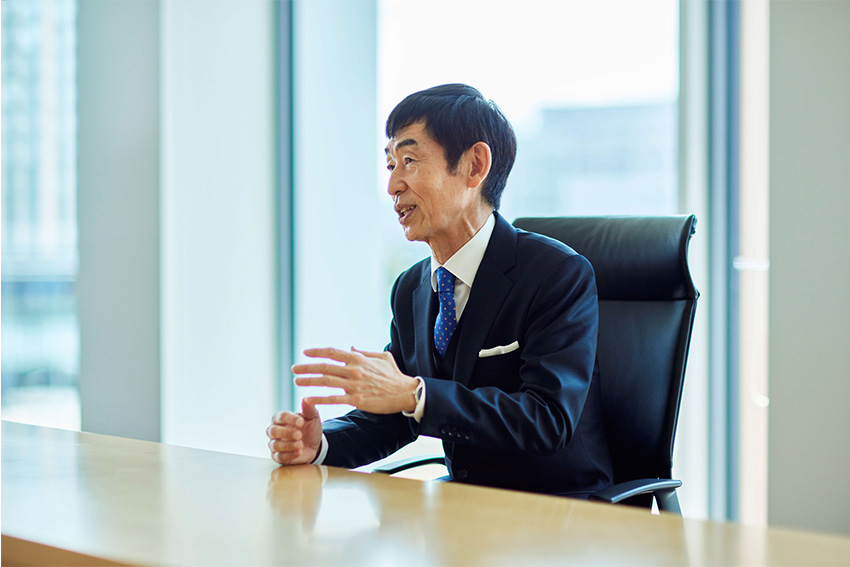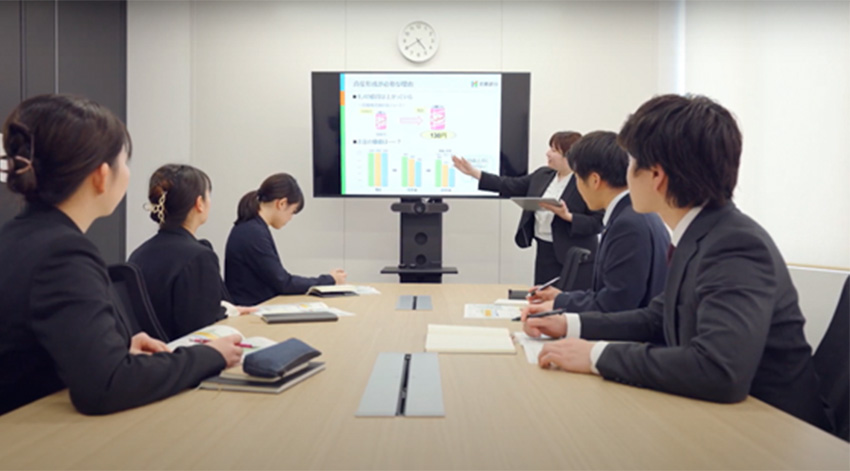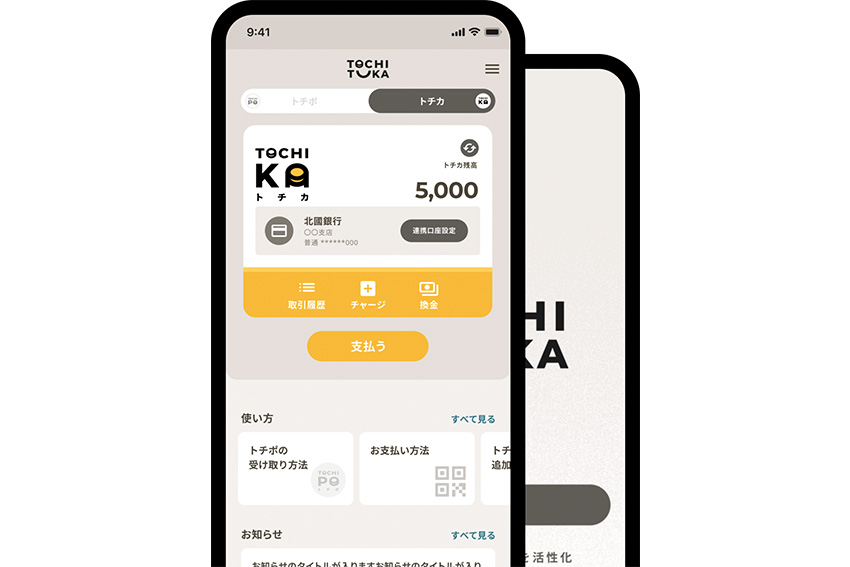Under its diverse portfolio of businesses, Hokkoku Financial Holdings is striving to make everyone's lifestyles better and to create a better society.

The Nikkei 225 has reached the JPY 40,000 mark, so this has been a record-breaking year for Japan’s financial markets. There’s been a surge in IPOs and private equity deals, and we’ve seen land prices and property values increase as well. This has drawn in unprecedented foreign capital. For example, there is now a ten-year high investment in Japanese equities, and foreign investment in Japanese real estate is now 45% from the first half of 2023. What are the core reasons for Japan's extraordinary performance in investment markets?
I think the biggest driving force in attracting foreign investors to Japan is the corporate governance reform that started four or five years ago. At first, it was seen as something only on the surface, but actually, substantial measures have been taken, leading to the current situation.
Another reason, among many, is that there’s been a shortage in various Japanese industries. I’m referring to both production and the labor shortage. This is creating a new business opportunity, as seen in foreign investors’ eyes.
Another big point that I should mention is that with COVID, there’s been replacement of presidents at SMEs, shifting more to younger generations. The mindset towards M&A has also changed as a result. Before, it was more about dominance or conquering of another company, whereas now the mindset is more about collaboration and creating a positive partnership to increase productivity and expand the business. Thus, M&A has become something much more familiar to Japanese companies.
How have these factors, together with increased interest in Japanese investment from foreigners, impacted the Hokuriku region where your company operates? What are some changes that you’ve seen recently?
You may think that major cities and rural areas are disconnected, but there’s a huge correlation since SMEs in rural areas depend on major companies in urban areas. Although there may be a time difference, the movement of the major companies is followed by the regional SMEs, especially in the manufacturing field. Our cross-shareholding in the past five years was predominantly in major companies in the prime market, but that’s now been extended to listed SMEs, so you can see a progression.
When foreign investors look at Japan, I think there’s a big debate happening. On the one hand, there are pessimists who argue that Japan’s recent performance and the interest that it has attracted are mainly based on macroeconomic factors, especially the weak yen and the low interest rate environment. On the other hand, you have the argument that Japan today is undergoing a historic transformation of corporate governance, including reform of the TSE to improve capital efficiency and reduce cross-shareholding and the Nippon (Japan) Individual Savings Account (NISA) to unlock more domestic capital. We could also add to this the intrinsic value of Japanese enterprises, especially as a new generation of leaders takes over from more conservative elders. The argument is that those are enough to carry Japan’s bullish environment forward. Should those macroeconomic conditions fully normalize, do you believe that those reforms will be enough to maintain the interest and the attractiveness of Japan as an investment destination?
I have the same bullish perspective, but it’s not all or nothing. The macroscopic impact and the internal reforms are both providing a positive effect. Foreign investors may at first use elimination to decide to invest in Japan, with the low interest rates and the devaluation of the yen, but combined with the internal reforms led by TSE, the investment environment has improved, so I consider now to be just the beginning and going forward there will be much more investment in the Japanese market.
Early results from those TSE reforms have shown an increase in corporate buybacks. As of May 2024, approximately JPY 9 trillion in buybacks has been announced. What corporate governance reforms have you implemented to boost your company’s valuation and shareholder returns?
We have made aggressive and substantial reforms in many ways, including resolving cross-shareholding. We have also reformed our governance structure to have half of the executive board members from outside the company, with no direct relationship with our business. Among those five outside executives, two are women, and one is the chair. We also have an external chair for our compensation committee. Despite these changes, we have unfortunately been unable to reach our minimum target of 5% ROE, so hopefully, that will be achieved next year.
Your company has roots dating back to 1943 with the creation of the Hokkoku Bank. In 2021, the company transitioned into a holding structure. Can you run through the evolution of the company, and tell us what role you have played in the development of the Hokuriku region, especially since the 2024 Noto earthquake?
In our 80-plus years of history, we have played a vital role as the local financial institution, and, especially after the earthquake, we have been providing financial support in various ways. Although loans related to the Noto Peninsula comprise only 3% of our total loans, we have been actively supporting the region in providing revitalization opportunities. For the first three or four months, the situation was quite harsh, but now, business is operating as usual.
For the past few months, we have been contemplating methods to rebrand ourselves with our corporate strategy department. Unfortunately, we weren’t able to establish and brand ourselves as a well-known, locally contributing financial firm. Tracing back a few years, in our attempts to rebrand ourselves, we have transformed into a holding company. Envisioning the future, in 30 years, there will be a population decline of maybe 20%, and that decline will be especially seen in regional areas, so as a financial institution, it’s important for us to improve our functionality as a bank. At the same time, we must provide other services that aren’t focused on the local area. Our Hokkoku Bank remains the regional bank, but we provide both domestic and international services.

We did an internal analysis to determine the best services and operations that would complement our banking business as a financial institution. We identified consulting advisory services and investment together with system operations, similar to what companies like Accenture are doing. Thus, we have strengthened our capabilities by establishing subsidiaries that focus on each segment to enlarge our business scope, not only for the Hokuriku area but also domestically and internationally. In the long-range future, we envision having not only Hokkoku Bank but also other banks under our umbrella, perhaps in the form of a business capital alliance or a subsidiary.
Our corporate purpose and strategy do not have a quantitative focus but a qualitative one, so rather than increasing our human resources, we would like to strengthen AI and other digital means to promote our company operations, and we want to only partner with those who share the same values as we do.
Hokkoku Financial Holdings’ business model consists of seven initiatives, some of which you already mentioned. Others include cashless digital payments, financing, DX modernization, market investments, and human capital management. What synergies are you able to create between these different business initiatives?
These seven segments emerged out of the needs of our customers, and we have brought all our experience and knowledge together to help them. For example, in our consulting operation, we have over ten years of experience and have started discussions with the Financial Services Agency (FSA), so we see a huge growth potential in this field. With diverse business segments, we can see a huge synergy as a result.
Regional financial institutions often tend to be homogeneous. They seem to be very similar in values and strategy, but we are quite independent, creating our own recurrent and risk management strategies. I think that makes us unique. For example, in terms of human resource management, there has recently been news that a megabank is restructuring, but we were actually the pioneers in carrying out this type of efficient human resource restructuring ten years ago. Of course, the major media never mention it. Anyway, we don’t mind what others are doing. We have our own unique strategy.
In 2021, you created CC Innovation, which offers services including business and management strategy, as well as ICT development and M&A-related services, and you’ve made the operation global. Very early on, you opened overseas in ASEAN countries, including Thailand and Vietnam. You then expanded to Singapore, China, and, more recently, Africa. Why did you decide to add this international focus from the beginning?
As a regional financial institution, our core mission is to create and revitalize the Hokuriku area, but to do so, remaining in the region is not a solution. We need to be connected overseas, especially as the next generation’s growth will be in Asia, Africa, and other emerging areas. Therefore, we are not only connecting with the major Japanese cities like Tokyo, Nagoya, and Osaka. We are also connecting to Asian and African cities. I visited our Nairobi office two months ago, and the strategy is not only to connect with Japanese companies but also to work with local non-Japanese companies. It is an interesting business.
Looking at the future, are there new regions that you would like to expand into, and are you currently looking for partners for your international business? If so, what does a partner of choice look like for your company today?
We haven’t confined ourselves to any specific industry, so we are open to collaboration, but it needs to be based on shared values with thorough communication or it would not be a successful partnership.
You launched your Corezo mall e-commerce platform, and you expanded it with Corezo Travel and Corezo Family Funding. How have these operations evolved over the past year, and what further developments do you envision?
We established the Corezo platform five years ago, and I’ve been saying that this project could be in deficit for some time since Amazon was in deficit for nine years till it started making money. The aim of this platform is more for social contribution and regional creation. You may wonder, if there are Amazon, Rakuten, and other major e-commerce channels, why create a new one? The reason is that those major channels can achieve considerable revenue, but the profit for SMEs is squeezed. It’s basically the commission fee that’s making the SMEs suffer. By creating this Corezo e-commerce channel that promotes local business, we can offer a maximum 5% commission fee and give them another sales channel. Kanazawa city and Ishikawa prefecture also have an online platform, so what we envision is integrating these to create one big platform that would make the products and experiences in the Hokuriku area more accessible to outsiders. This project is not expected to generate billions of yen in revenue. Rather, it’s more of a social impact project.

It’s interesting how your bank is using digital technologies in innovative ways to connect the region to the world and to provide social services to revitalize. Something that goes along those lines is your digital payments and cashless-related services. You’ve done some more traditional vehicles like the Hokkoku DX cashless fund, created in 2020, to help the transition to cashless payments. You also created Suzu Tochika, a digital currency stablecoin, to offer tokenized deposits and blockchain payments in collaboration with Suzu City. I read that you are now thinking about expanding this to other areas. One of the big issues that you find with blockchain technology is that it has great potential with very few real-life applications so far. What advantages can the utilization of digital currencies provide to the regional revitalization of the Hokuriku region?
There are two parts to the answer. First, regarding digital transformation, we are now at the last phase of the corporate transformation, which includes digital transformation and system modernization, and the operational changes pertaining to those transformations.
The Japanese technical environment and digitalization are based on Big Tech or integrators like NEC, Fujitsu, and Hitachi, and that’s been the culture for the past 30 years. Our mindset, however, was that we should take a different approach and go directly to the service manufacturers like Microsoft and Google. Thanks to our direct relationship with those companies, we could create our own unique core banking and subsystems. We don’t want to limit these activities to our holding companies. Rather, we want to actively reach out to other regional companies as part of our consulting so we can expedite their corporate transformation, and this local digital currency is one attempt to promote that digital transformation.
Hokkoku Bank was promoting debit cards long before they became mainstream in Japan. However, credit card and debit card transactions require a 1% to 2% commission fee, and that’s been a burden on SMEs, so we wanted to develop a scheme that allows the commission fee to be limited to less than 1%, while still maintaining fast transactions. What we discovered was this digital, tokenized deposit which uses blockchain technology to reduce the burden on the local systems and still retain a high fast response.
We are only at the entry phase and now the payment is done between individuals. Next will be individuals to companies and then between companies. Finally, the system would be taken into the metaverse, so in the near future we expect the payment transaction fee to be much lower.
To launch this digital currency, there has been a meticulous ongoing discussion with the Financial Services Agency, so the legal and technological bindings have been cleared and now it’s a matter of how to expand the number of active users of this scheme.

Your mid-term strategy has a goal of growing funds to JPY 120 billion by 2027. You also founded QR Investment in 2021, which is a corporate venture capital investment arm that covers various phases of the company lifecycle. Are you looking to expand the scope of your investment business beyond this region, and how important is attracting foreign investment to the region?
QR investment already has quite a considerable portion of investments out of the region. The initial purpose was to concentrate on the local companies, but over time, we have expanded our investment portfolio. Of our JPY 100 billion in assets, 40% is used for investment, and the return is like a J curve, with an up and down.
We have a longstanding track record on the revitalization and restoration fund, so fully leveraging on that experience, we want to create synergy among our loan and lease investment and advisory segments.
FDAlco is the investment advisory arm of your holdings, which was created via a merger with Alcolabo in 2023. What advantages do you expect it will bring to your capital markets department, and how will this expertise in multi-asset funds contribute to the enhancement of your portfolio?
Historically, we have had an investment trust as one of our core products, fulfilling a financial duty not through charging high upfront fees but by encouraging customers to consider the stock as mid-term or long-term investments. The head of the Financial Services Agency, who has since retired, had long insisted that a financial institution should make money through advisory fees, not from upfront fees.
The reason we merged with Alcolabo is that they were generating revenue through advisory fees. Through our discussions, we realized that a merger would strengthen our capabilities. With this merger, we have established a scheme where we can provide advisory services to individuals, institutions, and financial entities, including acting as an advisor to Hokkoku Bank. Unlike the US or Europe, with a longstanding history of capital markets, it’s still difficult for the Japanese to understand advisory services fees, so we are slowly but surely trying to spread that in Japan as well.
Regarding your question about multi-asset funds, that came from the Alco experience. Our strength is that we have formulated our own multi-asset approach, and we are proud to say that this has been one of the attractive and successful products that we have.
Compared to traditional regional banks, which are quite conservative, Hokkoku Financial Holdings seems to have a spirit of innovation and global expansion. We discussed the changes you’ve been making since 2021, including the strengthening of your consulting advisory services, the big push you’ve made towards DX, both internally and externally, and this enhancement of your investment division. With all those changes occurring, what’s the next step after you have achieved those objectives? How do you want to further transform the company?
We have had over 60 one-on-one meetings with our investors, and they all point out that they understand our new structure and vision. That has been highly appreciated, but the results haven’t followed. The 8% ROE goal hasn’t been realized. We haven’t even reached 5%. As CEO, I am pressured, but I honestly would say I’m not in such a rush because we are currently at the model generation stage. Once we have formalized and confirmed this model, it will be time for the revenue-generating stage. There was also the earthquake early this year, so our progress has been postponed for a year or two, but we will soon enter the focus on the returns phase. Towards next spring, we will make maybe three public announcements, so please watch for those.
Is there a goal or ambition that you would like to achieve during your tenure as president of Hokkoku Financial Holdings?
As the president of this company, my mission is to create a scheme that not only generates revenue and profit but also has a social impact that contributes to the betterment of society. Our mission is to revitalize and create a better society through the financial institution role that we play. In the upcoming year, we will make several announcements detailing our business model. Since it’s quite a long-term vision, with my limited lifespan, I don’t think I’ll be able to see the end, but I would like to take the holdings to a state where we have successful, accelerated operations within the profit-driving phase.
The engine driving our holdings is the corporate culture. Unlike traditional Japanese companies that are based on a hierarchy system, we have more diversity and inclusion, with a flat and agile structure. Some executives worry we are getting too flat, but that is providing new motivation and allowing more agility for our staff members. They can also work remotely, and they seem to enjoy the work, so we want to keep promoting this unique culture and system.
For more information, visit their website at: https://www.hfhd.co.jp/english/
0 COMMENTS